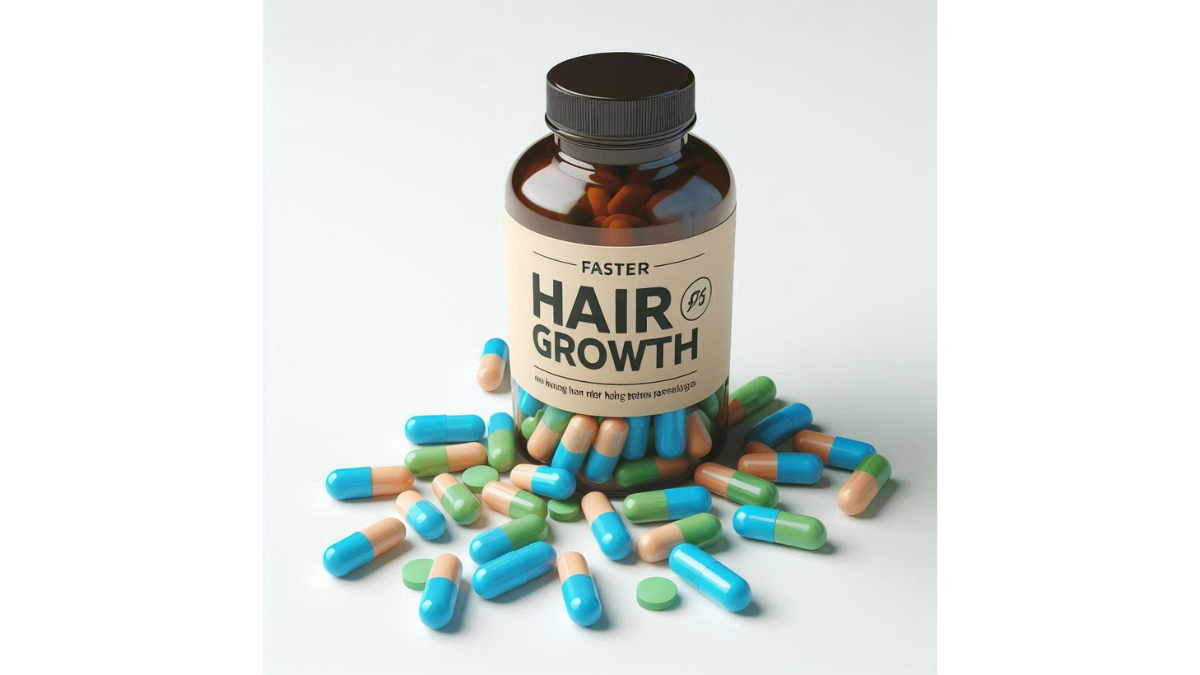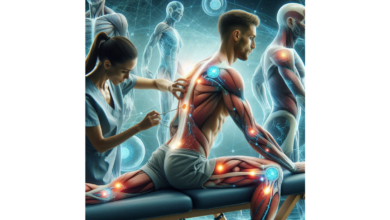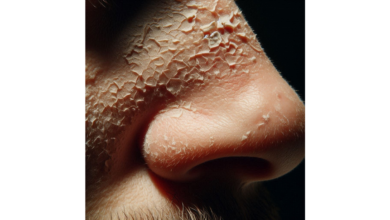Best hair vitamins for faster hair growth

Best hair vitamins for faster hair growth – When it comes to achieving luscious locks and vibrant hair health, understanding the role of vitamins and nutrients is essential. Many people overlook the impact that diet and specifically, hair vitamins, have on hair growth. In fact, nourishing your hair from within is perhaps the most effective way to promote hair growth and maintain its strength. Have you ever experienced hair thinning or breakage? If so, you’re not alone—many face similar challenges. Imagine waking up to a full, thick mane every day; it’s a common desire among many. To achieve this, you might have scoured the internet for the best hair vitamins for faster hair growth, hoping to find a magic pill. However, the truth is that hair health stems from a combination of good nutrition, adequate hydration, and utilizing the right vitamins. In this article, we will delve into the vitamins and minerals that play a crucial role in promoting hair growth. You will discover:
- The essential benefits of Vitamin A for your hair.
- How B vitamins lay the foundation for hair strength.
- The powerful impact of Vitamin C on collagen production.
- The importance of Vitamin D in maintaining healthy hair follicles.
Whether you’re trying to restore your hair’s former glory or simply want to maintain its health, learning about these nutrients can significantly influence your hair journey. So, let’s uncover the secrets of healthy hair together!
Understanding Hair Growth
To truly appreciate the impact of the right vitamins on hair health, it’s essential first to understand how hair grows. Have you ever marveled at how some people sport vibrant, flowing hair while others seem to struggle? It all begins with the hair growth cycle, which consists of three primary phases:
The Hair Growth Cycle
- Anagen Phase (Growth Phase): This phase can last from two to six years, during which the hair actively grows. Genes play a significant role in determining the length of this phase, and certain vitamins can help extend it.
- Catagen Phase (Transition Phase): Lasting about two to three weeks, this transitional phase allows the hair follicle to shrink, and hair stops growing. This natural process is crucial for keeping hair healthy.
- Telogen Phase (Resting Phase): This phase lasts around three months, after which the hair falls out to make way for new growth. Nutrition during this time is vital as it can affect how quickly new hair begins to grow.
When considering your hair’s health, it’s easy to become frustrated, especially if you’re experiencing hair loss or thinning. I remember when my hair felt limp and lifeless, and it turned out my diet lacked essential nutrients.
Addressing Hair Health
Understanding this cycle helps us realize that hair growth is not solely about what we see on the outside but also about the nourishment we provide from within. Here’s a quick checklist of factors to consider for optimal hair growth:
- Nutrition: Ensure you’re including the right vitamins and minerals in your diet.
- Hydration: Drink sufficient water daily.
- Scalp Health: Maintain a clean and nourished scalp for better growth support.
By grasping these fundamentals, you’re better positioned to take advantage of the best hair vitamins for faster hair growth and take proactive steps toward achieving your hair goals!
Vitamin A: The Key to Healthy Hair
Having explored the fundamentals of hair growth, let’s dive into one of the most vital nutrients for maintaining that healthy shine: Vitamin A. You might wonder, “How can one vitamin make such a significant difference?” Well, Vitamin A is not just crucial for good vision; it plays a pivotal role in ensuring your hair remains vibrant and resilient.
Benefits of Vitamin A for Hair Growth
Vitamin A helps in creating sebum – a natural oil produced by the sebaceous glands in your scalp. This oil acts as a moisturizer and plays a key role in keeping your hair shiny and hydrated. I remember the first time I added more Vitamin A-rich foods to my diet. Almost immediately, I noticed my hair felt less dry, and the overall health improved! Here’s a closer look at the specific benefits of Vitamin A for hair growth:
- Supports Healthy Sebum Production: Sebum is essential for keeping your scalp moisturized, preventing dryness that can lead to hair breakage.
- Boosts Cell Production: Vitamin A promotes healthy cell growth, which is vital for hair follicles to produce new hair strands.
- Rich in Antioxidants: As an antioxidant, Vitamin A helps combat oxidative stress on the hair follicles, keeping them healthy.
Best Sources of Vitamin A
To incorporate more Vitamin A into your diet, consider adding the following foods:
- Sweet Potatoes: Rich in beta-carotene, which the body converts into Vitamin A.
- Carrots: A crunchy and delicious source, perfect for snacking.
- Kale and Spinach: Leafy greens packed with not just Vitamin A but also many other beneficial nutrients.
By making these dietary adjustments, you can harness the power of Vitamin A to promote healthier hair growth and tackle common hair issues effectively!
B Vitamins: The Building Blocks of Hair
Now that we’ve uncovered the importance of Vitamin A, let’s turn our attention to another vital group of nutrients essential for hair health: B vitamins. These essential vitamins serve as the building blocks for your hair’s overall structure and vitality. Several years ago, I learned the hard way how crucial these vitamins are when I noticed significant hair thinning during a particularly stressful period. It prompted me to research and rethink my diet, leading to a discovery about B vitamins that I wish I had known earlier!
Role of B Vitamins in Preventing Hair Loss
B vitamins, including B7 (biotin), B6, and B12, are known for their diverse roles in promoting healthy hair. They not only support hair growth but also prevent hair loss by ensuring proper blood circulation and delivering oxygen and nutrients to hair follicles. Here’s how they contribute:
- Biotin (B7): Often called the “hair vitamin,” biotin plays a crucial role in synthesizing keratin, a protein that makes up your hair. A deficiency can lead to brittle hair and even bald patches.
- B6: This vitamin helps regulate hormones that might contribute to hair loss. By balancing these hormones, B6 can prevent conditions leading to excessive shedding.
- B12: Often linked to healthy blood cells, B12 ensures effective oxygen distribution in the blood, crucial for healthy hair follicles. A lack of this vitamin can lead to hair loss and fatigue.
Incorporating B Vitamins into Your Diet
To reap these benefits, consider incorporating the following foods into your meals:
- Eggs: A fantastic source of biotin and B vitamins.
- Fish: Salmon and tuna are rich in B12.
- Nuts and Seeds: Almonds and sunflower seeds provide a variety of B vitamins.
By ensuring you’re getting enough B vitamins, you’ll be investing in the strength and resilience of your hair, helping to prevent those frustrating strands from falling out!
Vitamin C: An Antioxidant for Stronger Hair
Transitioning from the foundational role of B vitamins, it’s crucial to delve into the powerhouse nutrient that is Vitamin C. Not only is this vitamin well-known for its immune-boosting properties, but it also plays a significant role in enhancing hair health. It’s incredible how a simple citrus fruit can positively affect your hair’s robustness! I recall when I started including more Vitamin C-rich foods in my diet, my hair not only felt stronger but also looked shinier.
Importance of Vitamin C in Collagen Production
Vitamin C is a pivotal player in collagen production, which is vital for maintaining the strength and integrity of hair follicles. Collagen is a protein that forms the building blocks of your hair and provides structure and elasticity, essential for healthy growth. Here’s how Vitamin C helps:
- Boosts Collagen Synthesis: Without adequate Vitamin C, your body can struggle to produce collagen efficiently, which can lead to weaker hair prone to breakage.
- Fights Oxidative Stress: As a powerful antioxidant, Vitamin C helps neutralize free radicals that can damage hair follicles and impede growth.
- Reduces Hair Loss: By promoting collagen formation, Vitamin C indirectly supports overall scalp health, minimizing hair loss.
Adding Vitamin C to Your Diet
To give your hair a fighting chance, start incorporating these Vitamin C-rich foods:
- Citrus Fruits: Oranges, lemons, and grapefruits are fantastic sources.
- Berries: Strawberries and blueberries not only taste great but are packed with antioxidants.
- Bell Peppers: Surprisingly high in Vitamin C, they can be added to various dishes.
By ensuring your diet is rich in Vitamin C, you’ll not only strengthen your hair but also enhance its overall appearance, making it look vibrant and full of life. It’s a simple yet effective way to support your hair growth journey!
Vitamin D: Promoting Hair Growth from Within
Moving on from the benefits of Vitamin C, let’s shine a light on another crucial nutrient for hair health: Vitamin D. This vitamin is often dubbed the “sunshine vitamin” because our bodies can synthesize it in response to sunlight. It was during a particularly rainy season that I realized how much I was missing out on Vitamin D; my hair was thinning, and I felt unusually fatigued. This pivotal nutrient not only supports overall health but plays a significant role in hair growth as well.
How Vitamin D Deficiency Affects Hair Health
A deficiency in Vitamin D can lead to various hair-related issues, primarily because it is essential for the growth and upkeep of hair follicles. Here’s how a lack of this vitamin can impact your mane:
- Stimulates Hair Follicle Growth: Vitamin D is known to activate the hair follicle growth cycle. When levels are low, it can lead to dormant follicles, resulting in hair that doesn’t grow as it should.
- Causes Hair Shedding: Insufficient Vitamin D can lead to hair loss conditions like alopecia areata, where the immune system attacks hair follicles, causing patches of hair loss.
- Affects Overall Hair Health: Without enough Vitamin D, the quality of your hair can suffer, resulting in hair that appears dull, lifeless, and prone to breakage.
Sources of Vitamin D
To support your hair growth journey, consider these effective sources of Vitamin D:
- Sunlight: A daily dose of sunlight can naturally boost your Vitamin D levels. Just 10-30 minutes, depending on your skin tone and location, can suffice.
- Fatty Fish: Salmon and mackerel are excellent dietary sources.
- Fortified Foods: Consider fortified cereals or plant-based milk to up your Vitamin D intake.
By ensuring you have adequate Vitamin D in your system, you’re fostering an environment where your hair can thrive, grow, and remain resilient!
Vitamin E: Nourishing Your Scalp
Having explored the significance of Vitamin D, it’s time to turn our attention to another treasure in the realm of hair health: Vitamin E. Known for its antioxidant properties, Vitamin E plays a crucial role in nourishing the scalp and promoting healthier hair growth. I remember incorporating vitamin E oil into my hair care routine after hearing rave reviews from friends who swore by its benefits. The results were undeniably impressive!
Using Vitamin E Oil for Hair Growth
Vitamin E oil offers a multitude of benefits when it comes to achieving luscious locks. Here’s why you should consider adding this powerful oil to your hair care regimen:
- Improves Scalp Health: Vitamin E oil can help soothe the scalp, reducing inflammation and supporting a healthy environment for hair growth.
- Boosts Blood Circulation: When massaged into your scalp, Vitamin E oil can enhance blood circulation, promoting the delivery of vital nutrients to hair follicles.
- Prevents Damage: The oil helps protect hair from oxidative stress and damage from environmental factors, allowing it to grow stronger and more resilient.
How to Use Vitamin E Oil on Your Hair
Using Vitamin E oil for hair growth is simple and effective. Here’s a straightforward method to incorporate it into your routine:
- Direct Application: Warm a few drops of Vitamin E oil in your hands, then massage it gently into your scalp.
- Overnight Treatment: For maximum benefits, apply the oil before bedtime, cover your hair with a shower cap, and wash it out in the morning.
- Add to Your Shampoo: Mix a few drops of Vitamin E oil into your regular shampoo for added nourishment during each wash.
By making Vitamin E oil a part of your hair care strategy, you can transform your scalp health and promote vibrant, flowing hair. Let nature work its magic, and you’ll soon notice the difference!
Iron and Hair Growth: The Connection
Continuing from our discussion on the nourishing properties of Vitamin E, let’s shift our focus to another essential nutrient that plays a pivotal role in hair health: iron. You may not immediately think of iron in relation to luscious hair, but its impact on hair growth is significant. I had my own “aha” moment about iron’s role in hair health after a friend shared her story of correcting anemia. Once her iron levels were back to normal, she noticed a remarkable difference in her hair’s fullness and strength.
The Role of Iron in Hair Growth
Iron is critical for producing hemoglobin, the protein in red blood cells that carries oxygen throughout the body. Since our hair follicles require a substantial amount of oxygen to thrive, insufficient iron can lead to weak hair and increased shedding. Here’s how iron deficiency affects hair:
- Reducing Oxygen Supply: Low iron levels impede oxygen delivery to hair follicles, resulting in stunted growth and even possible hair loss.
- Inhibiting Growth Cycle: When iron is lacking, hair may enter the resting phase prematurely, leading to excessive shedding and slower regrowth.
How to Boost Your Iron Intake
To ensure your iron levels are optimal for healthy hair growth, consider these dietary sources:
- Red Meat: Beef and lamb are rich in heme iron, which is easily absorbed by the body.
- Leafy Greens: Spinach and kale contain non-heme iron, which can be a great source for vegetarians.
- Legumes: Lentils and beans are excellent plant-based iron sources.
- Nuts and Seeds: Almonds and pumpkin seeds provide a healthy way to increase your iron intake.
By keeping your iron levels in check, you’re providing your hair with the necessary building blocks for growth and vitality. This simple yet effective change in your diet can lead to remarkable improvements in hair health!
Omega-3 Fatty Acids: Essential for Healthy Hair
Now that we’ve explored the vital role of iron in hair growth, let’s talk about the powerhouse nutrient known as Omega-3 fatty acids. These essential fats are not only beneficial for heart health but also play a significant role in promoting healthy hair. A few years back, I was struggling with dry, brittle hair, and a friend recommended I increase my intake of Omega-3s. After a few months, I noticed a remarkable change—my hair was shinier, softer, and much more manageable!
The Benefits of Omega-3 Fatty Acids for Hair
Omega-3 fatty acids boast several benefits that are crucial for hair health. Here’s how they contribute to keeping your locks looking their best:
- Promotes Scalp Health: Omega-3s help nourish the scalp and reduce inflammation, creating a healthy environment for hair growth.
- Supports Hair Follicle Function: These fatty acids strengthen hair follicles, which can lead to less hair loss and more robust hair growth.
- Adds Shine and Moisture: Omega-3s penetrate the hair shaft to help lock in moisture, making your hair look shinier and feel softer.
Incorporating Omega-3s into Your Diet
To reap the benefits of Omega-3 fatty acids, consider adding the following foods to your meals:
- Fatty Fish: Salmon, mackerel, and sardines are excellent sources of Omega-3s.
- Chia Seeds: These tiny seeds pack a nutritional punch and can be added to smoothies, oatmeal, or yogurt.
- Flaxseeds: A great source of plant-based Omega-3s, flaxseeds can be sprinkled on salads or incorporated into baked goods.
- Walnuts: A delicious snack option packed with Omega-3 goodness.
Incorporating Omega-3 fatty acids into your diet is an easy and effective way to enhance your hair’s health. By ensuring you have an adequate intake, you’re setting the stage for naturally gorgeous, vibrant hair that turns heads wherever you go!
Zinc: A Mineral for Hair Growth
As we continue our exploration of key nutrients for hair health, let’s shine a spotlight on zinc. While often overshadowed by more well-known vitamins, zinc is a mineral that plays a crucial role in promoting hair growth and maintaining a healthy scalp. I first learned about the benefits of zinc after a frustrating period of hair thinning. A nutritionist suggested I could be lacking in this mineral, and after adding more zinc-rich foods to my diet, I noticed a difference in both the thickness and vitality of my hair within weeks!
The Role of Zinc in Hair Growth
Zinc is essential for various bodily functions, but its impact on hair growth is particularly noteworthy. Here’s how this mineral benefits your luscious locks:
- Supports Hair Follicle Function: Zinc is vital for the proper functioning of hair follicles, ensuring they remain active in the hair growth cycle.
- Aids in Protein Synthesis: It helps in the synthesis of proteins like keratin, which is essential for hair structure. Without adequate zinc, your hair can become weak and brittle.
- Balances Hormones: Zinc plays a role in regulating hormones, which can prevent hair loss due to hormonal imbalances.
Foods Rich in Zinc
To ensure you’re getting enough zinc, try incorporating these foods into your diet:
- Oysters: One of the richest sources of zinc.
- Red Meat: Beef and lamb are excellent options that can easily fit into various meals.
- Poultry: Chicken and turkey also provide a good dose of zinc.
- Legumes: Chickpeas, lentils, and beans are great plant-based sources.
- Nuts and Seeds: Pumpkin seeds and cashews make for convenient snacks while boosting your zinc intake.
By focusing on the inclusion of zinc-rich foods in your diet, you’re actively taking steps toward healthier, thicker hair. It’s a small yet impactful way to support your hair growth journey and overall well-being!
Incorporating Hair Vitamins into Your Routine
Having learned about the crucial role of various vitamins and minerals in promoting hair growth, the next step is figuring out how to incorporate these essential nutrients into your daily routine effectively. When I initially started my hair health journey, I felt overwhelmed by the vast information on which vitamins to take and how best to consume them. Over time, I discovered a few practical strategies that made it easier to prioritize hair vitamins.
Strategic Dietary Changes
One of the simplest ways to integrate hair vitamins is through your diet. Here’s how you can make these changes:
- Plan Your Meals: Start by creating meal plans that include foods rich in the vitamins we’ve discussed. For example, include eggs for biotin, fatty fish for Omega-3s, and leafy greens for iron.
- Healthy Snacks: Keep snacks like nuts and seeds on hand. Not only are they convenient, but they also deliver a healthy dose of vitamins as you go about your day.
- Smoothie Boost: Start your morning with a smoothie packed with spinach, berries, and a scoop of protein powder that contains essential nutrients.
Supplementation Options
If you find it challenging to meet your nutrient needs through diet alone, consider these options:
- Multivitamins: Look for those specifically formulated for hair health that include a blend of necessary vitamins and minerals.
- Individual Supplements: If you’re aware of specific deficiencies, you might benefit from targeted supplements like biotin or Vitamin D.
- Consult with a Professional: Prior to starting any new vitamin regimen, it’s a good idea to consult a healthcare professional to ensure you’re making informed choices.
Incorporating hair vitamins into your routine doesn’t have to be daunting. By making small, gradual changes to your diet and possibly incorporating supplements, you’ll be well on your way to achieving the vibrant, healthy hair you desire!
Tips for Maximizing the Benefits of Hair Vitamins
Now that you have a solid understanding of the essential vitamins and how to incorporate them into your routine, let’s discuss some tips for maximizing their benefits. When I first began my hair care journey, I quickly realized that simply taking vitamins or eating nutrient-rich foods wasn’t enough; I needed a holistic approach. Here are some tried-and-true strategies to help you harness the full potential of hair vitamins:
1. Consistency is Key
- Daily Routine: Commit to taking your vitamins consistently. Set reminders on your phone or keep them by your toothbrush to make it a part of your daily routine.
- Patience: Hair growth is a gradual process. Give your body time to respond and ensure you follow your regimen for at least three months to see noticeable changes.
2. Combine with a Balanced Diet
- Nutrient Diversity: Focus on a well-rounded diet that encompasses a variety of vitamins, minerals, and antioxidants. This helps optimize absorption. For example, pairing Vitamin C-rich foods with iron sources can enhance iron absorption.
- Hydration: Drink plenty of water throughout the day. Staying hydrated supports overall health and contributes to scalp health, helping hair retain moisture.
3. Lifestyle Factors Matter
- Reduced Stress: High stress levels can negatively impact hair growth. Incorporate stress-reducing activities like yoga, meditation, or regular exercise into your routine.
- Avoid Harsh Treatments: Limit the use of chemical hair treatments and heat styling tools that can deplete your hair’s vitality. Instead, opt for gentle, natural care products.
By applying these tips, you’ll be well on your way to maximizing the benefits of hair vitamins. Remember, healthy hair is a reflection of overall well-being, so embracing a holistic lifestyle will bring you closer to your hair goals. Here’s to a beautiful, vibrant mane!
You might also find this article helpful Bone Health: Building Strong Bones






3 Comments